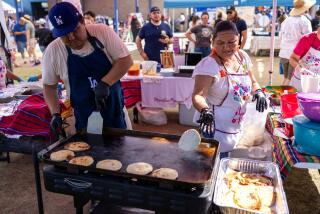Celebrating the Fruits of Chavez’s Labor for Farm Workers
When Enriqueta Ramos insisted, 32 years ago, on driving from her home in Fountain Valley to Central California to join the Delano-to-Sacramento farm workers march, her husband and mother objected. They did not identify with her zeal to help Cesar Chavez and impoverished farm workers.
Before the weeklong march was over, Ramos’ 85-year-old mother wound up walking beside her.
Ramos, now a professor of Chicano studies at Cypress College, recalled: “My mother told me that when she first saw Cesar Chavez, there was a sadness in his eyes that projected the sadness of the world.”
Today is the birth date of Cesar Chavez, founder of the United Farm Workers union. He died five years ago at age 66, his health having deteriorated from numerous hunger strikes to raise awareness of the farm workers’ plight.
In Orange County, there is much evidence of the lasting impression this revered leader made on people here and elsewhere. A Santa Ana continuing high school is named for him. So is a building at Santa Ana College. The Orange County Hispanic Chamber of Commerce presents an annual award in Chavez’s name. And there is an active United Farm Workers student group at UC Irvine. But some fear younger generations might grow up not recognizing his role in California--and American--history.
“You say ‘Cesar Chavez’ and some people think you’re talking about the boxer,” said Rueben Martinez, who owns the Martinez Book and Art Gallery in Santa Ana.
Martinez worked for Chavez, the union leader, as a young man in the 1960s.
“We made $5 a week,” he said. “But the money didn’t matter. We knew what we were doing was important.”
Martinez believes Chavez’s commitment to nonviolence helped bring nationwide support for his labor efforts. Especially the grape and lettuce boycotts, which helped pressure growers to improve working conditions and raise wages for workers in the fields. But Chavez’s ways could be exasperating too, Martinez said.
“One day when I was trying to organize a group, a woman spit on me. I was so angry I wanted to fight back. But if you ever retaliated, you were out of the movement. Cesar Chavez would not tolerate us answering violence in any way.”
Chavez lacked a formal education; his teen years were spent in the fields to supplement the family income. Even so, it was his eloquence that won supporters. Amin David, president of Los Amigos, a local Latino activist group, can remember introducing Chavez on several occasions to Orange County audiences and watching the reaction:
“It was his serenity. We were drawn to his magnetism. He spoke with such calmness, yet he drew us spiritually into his arena.”
Ramos was so impressed that she wound up spending a week living with a farm worker’s family, to help her learn about the movement.
“I was a city girl and really knew nothing about how these people had to live,” she said. “The living conditions shocked me.”
Ramos, also on the board of the Rancho Santiago Community College District, spent several years after that organizing students on Chavez’s behalf. She persuaded them to participate in marches or efforts to boycott produce grown by uncooperative farm corporations.
Even today, Ramos continues to wear a “Boycott Grapes” pin wherever she goes. She remembers that 200-mile march from Delano to Sacramento as “the most exhilarating experience of my life. Cesar Chavez was a voice for those who had no voice.”
Teresa Mercado-Cota, communications director at Santa Ana College and the daughter of migrant farm workers, echoed the feelings of many of Chavez’s admirers: “Cesar Chavez is important not just to Mexican Americans. These farm workers were Filipinos, Anglos, Native Americans. He should be honored by all races. We all should remember his birth date.”
Among the more than 40,000 people who attended Chavez’s funeral was Veronica Perez of Santa Ana, now a UC Irvine senior and mother of four. She had first marched with Chavez as a seventh-grader in 1979.
“I wanted to go to his funeral,” she said, “to make sure there were other people like me, determined that this day did not mean the end. That this movement would continue.”
She has since participated in demonstrations in Watsonville, her young children marching alongside her.
“I was a latecomer to the movement,” she said. “But Cesar Chavez did much to create opportunities for people like me. I have to continue that spirit, pass it on to my children.”
Like many colleges, the Rancho Santiago Community College District has special get-acquainted days for kindergartners to learn about college life. But at Rancho it’s also designed to honor Chavez. Called KinderCaminata, it’s held close to Cesar Chavez’s birth date, to highlight that anything is possible through hard work.
There’s a special guest coming as honorary grand marshal on Friday for KinderCaminata at Santiago Canyon College in Orange. He is Andres Chavez, a 5-year-old grandson of the famed labor leader.
The young Chavez will welcome the students as they arrive and lead them across campus to career stations set up for them.
The same kind of organizational work his grandfather did.
Jerry Hicks’ column appears Tuesday, Thursday and Saturday. Readers may reach Hicks by call-ing the Times Orange County Edition at (714) 966-7823 or by fax to (714) 966-7711, or e-mail to jerry.hicks@latimes.com
More to Read
Sign up for Essential California
The most important California stories and recommendations in your inbox every morning.
You may occasionally receive promotional content from the Los Angeles Times.










